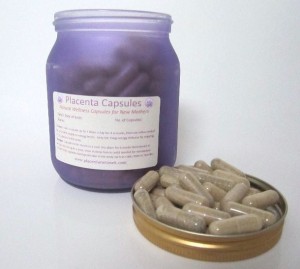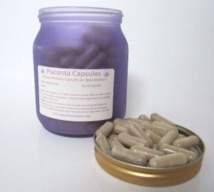London, United Kingdom- 25 March 2015- Corinne Purtill reports that pills prepared from human placentas are being sold in the United Kingdom. The entire nation is debating over the issue as to whether such practices should be allowed to continue or would it amount to cannibalism.
Report says that specialists have devised different ways of consuming the placenta, some blend the organ after the birth and drink it with smoothies while others dehydrates the umbilical placenta, grinds it into powder and takes it in doses along with simply everything they eat either in the form of pills or as cookies.
Placenta is the mediating organic chord that enables metabolic exchanges between the mother and the growing fetus in the womb. It is this fetal membrane which in association of certain uterine and embryonic membranes helps in the excretion, nutrition and respiration process of the developing baby. However, shortly after the delivery the placenta is discharged from the mother’s body.
The birth process of a baby is quite a theatrical scene as the new born emerges from the womb amid blood and amniotic fluid soon after that within a few minutes’ gap the placenta also follows. It is immensely surprising to know that the placenta appears to be a hefty organ that comes in an “unheralded mess” and weighs up to almost a pound post-birth. According to Corinne Purtill the placenta resembles “an adventurous purchase from the butcher’s”.
Nevertheless, the practice of consuming the placenta after birth can be witness among animals. In fact, the practice of humans eating the placenta is not a new one. Moreover, a term called “Placentophagy” was even coined to depict such practices.
Initially, the placentas were considered as “bloody detritus” involved in the birth process. As a result, it used to be burnt to ashes in the hospital incinerators. However, towards the end of 1960’s or maybe sometimes in the beginning of 1970’s, in the United States of America, there was a growing trend of “medication-free childbirth” which used to be supervised by mid-wives.
During this period, a certain group of mid-wives began to advocate the practice of placental consumption to the newly delivered mother as a prescribed remedy for iron deficiency and “postpartum depression” among other health issues.
However, at present various heated debates are being held in United Kingdom over whether specialists should be allowed to manufacture “placenta-based foods” on a commercial basis. In fact, Kathryn Beale, from Swindon, who runs a business of preparing capsules from dried placenta for the consumption of mothers who have recently delivered their babies, got a legal notice from the health officials. The notice claimed that her medicines “posed ‘serious risk to human health’”.
Nonetheless, the accused took the matter to court and even won a verdict in her favour giving her the right to continue her business practice. Furthermore, the European Food Safety Authority termed “placenta-based products” as “novel food” products. Consequently, anyone selling such food material will have to provide extensive documentation, which will prove to be expensive, in order to legally sell placental-based food in the Europe; although, individual countries can exempt such practices within their territory.
In Britain, all the placenta-based food productions are suspended temporarily as it is under the scrutiny of Food Standards Agency.
References:
http://www.mintpressnews.com/now-the-brits-are-eating-placentas/203681/
Placentophagy Is Currently In Vogue In Britain
04/01/2015 - 15:47
Being true to the saying that “history repeats itself”, there is a growing practice of commercialised placenta-based food production in Britain. However, the said market has come to a standstill as it is under the scrutiny of the Food Standard Agency.
More
Friday, April 18th 2025 - 03:12 WTO head: Trade war between the US and China may drag the world into recession |
Friday, April 18th 2025 - 03:10 ECB keeps softening monetary policy “to support European economy” |
Most Popular
Innovation & tools
Discovery



















